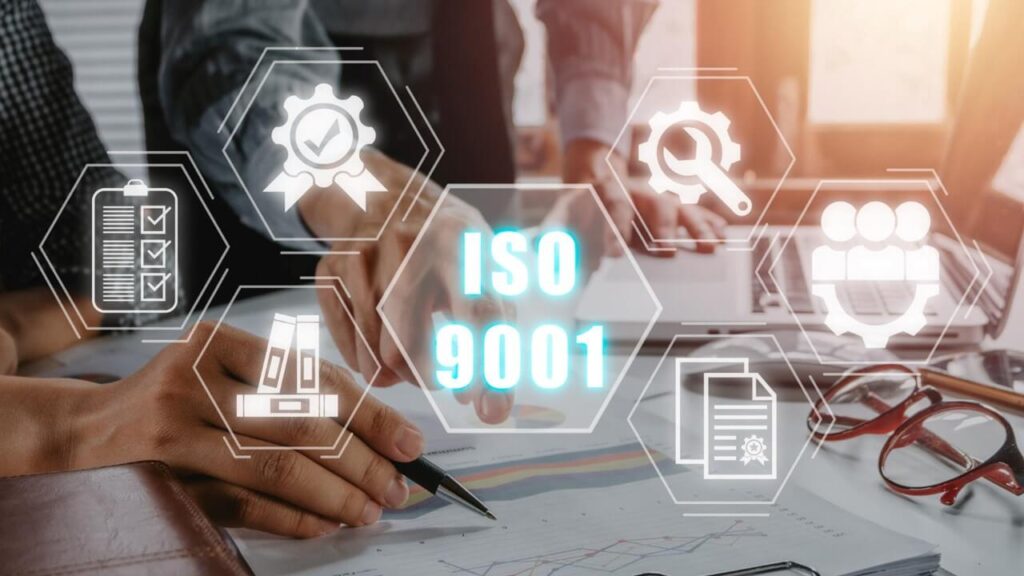ISO 9001 - QUALITY MANAGEMENT SYSTEMS
Home » Consultation Services » ISO 9001:2015 Quality Management Systems
Enhance Business Efficiency and Customer Satisfaction
ISO 9001 is the global standard for Quality Management Systems (QMS), providing a ‘generic’ framework for organizations of all sizes or types, enabling them to improve overall performance and provide products or services that consistently meet customers’ requirements and expectations. The ISO 9001:2015 is widely adopted by manufacturing and service organizations, non-profit organizations, and government agencies all over the world.
At SQC, we provide comprehensive ISO 9001 consultancy services, helping organizations in Malaysia to streamline the certification process and to adopt effective quality management principles. Whether you’re in manufacturing, healthcare, or services, ISO 9001:2015 certification can enhance your competitive edge by boosting quality and customer satisfaction.

ISO 9001:2015 Requirements
ISO 9001:2015 has ten sections. Three sections are general information for your company about the standard and are not auditable. Certification focuses on the seven key auditable sections:
- Context of the Organization
- Leadership
- Planning
- Support
- Operation
- Performance Evaluation
- Improvement
The evolution of the standard brought increased requirements for companies to demonstrate continual improvement, reduced risk, and provided overall focus on customer satisfaction using a process approach.
The Process Approach in ISO 9001
ISO 9001 is based on the “process approach” i.e., a chain of added value activities delivering a product or service to a customer (internal or external) of the process. A process focused approach includes:
- Understanding and meeting customer requirements
- Attention to customer satisfaction
- Continual improvement
- Application of the “Plan-Do-Check-Act ” (PDCA) or equivalent cycle
- Managing interrelated processes
- Links between quality and business plans and objectives
- Defining and using process metrics
- Every business operates via processes. ISO 9001 can be applied to any organization’s quality management system.
Benefits of Implementing ISO 9001
Implementing an ISO 9001 Quality Management System offers significant advantages for your organization:
- Improved Quality Control: Establish processes with consistent quality and product reliability, reduce errors and risk of rework.
- Increased Customer Satisfaction: Gain trust by meeting customer expectations and industry standards.
- Operational Efficiency: Streamline operations to reduce costs, waste, and inefficiencies; Improve communications among employees.
- Regulatory Compliance: Strengthened commitment to meet both local and international quality regulations.
- Continuous Improvement: Foster a culture of quality improvement, encouraging growth and quality-focused leadership.
It may not be readily apparent, but ISO 9001 can also be applied to address items such as: customer concerns, administration issues, equipment up/downtime, and process efficiencies.

Continual Improvement: A Quality Paradigm
The pursuit of continual improvement is at the core of effective quality management systems (QMS). Adopting proven, cost-effective approaches to quality enhancement can lead to better operational efficiency and customer satisfaction. An effective QMS aligns well with broader business objectives and goals, including:
- Reduced variation in work practices
- Clear standardized work instructions
- Enhanced intra- and interdepartmental communications
- Practical metrics that reflect progress
- Reduced operating costs
- Error prevention
- Reduced liability exposure and cost
- Top management commitment and support
Integrating continuous process optimization as guided by quality management standards helps organizations develop systems that not only meet compliance requirements but also drive long-term success through optimized processes and strategic alignment.
Professional ISO 9001 Consultant in Malaysia
At SQC, our comprehensive ISO 9001:2015 consulting services guide your business through each step of certification, ensuring compliance with the ISO 9001 standard and setting your organization up for long-term success. Our process includes:
Initial Consultation and Assessment
We conduct a thorough analysis to understand your organization’s goals, current practices, and desired outcomes with ISO 9001 standards. This helps us identify your unique needs and expectations.
Planning and Customization
We assist in developing a tailored plan for ISO implementation. This includes defining the implementation scope across relevant departments, setting timelines, and collaborating with your team to establish an effective schedule.
Analysis and Policy Development
Our consultants conduct a thorough gap analysis, comparing existing processes with ISO 9001 requirements. We then assist in creating a customized documentation framework, revising policies, and aligning procedures to bridge identified gaps.
Training and Implementation
Working alongside your team, we support the rollout of new processes identified in the gap analysis. We provide targeted training to ensure employees understand ISO 9001 standards, the importance of compliance, and their role in maintaining a quality management system. We also establish an internal audit program to monitor progress.
Pre-Certification and Audit Support
Before the certification audit, we conduct a pre-certification audit to evaluate your organization’s ISO 9001 readiness. Our team helps implement corrective actions if needed and supports your selection of a reputable certification body. We guide you through the final certification audit process to ensure success.
Continuous Support and Improvement
After achieving ISO 9001 certification, we work with your organization to foster a culture of continuous improvement, conducting periodic reviews to maintain compliance. Our ongoing support ensures your QMS adapts effectively to changing needs and industry standards.
FAQs on ISO 9001 Quality Management System
What is ISO 9001:2015 QMS?
ISO 9001 is a globally recognized standard for Quality Management Systems, focusing on continuous quality improvement within an organization. ISO 9001:2015 is the most recent version of this standard, replacing the previous ISO 9001:2008.
Why is ISO 9001 important for my business?
ISO 9001 certification demonstrates a commitment to quality, customer satisfaction, and regulatory compliance. It also helps streamline processes, reduce costs, and improve operational efficiency.
What are the requirements for ISO 9001 certification?
ISO 9001 certification requires alignment with seven key sections of the standard, including Context of the Organization, Leadership, Planning, Support, Operation, Performance Evaluation, and Improvement. These ensure a systematic approach to quality management. Get in touch with our consultants to find out more.
How long does it take to achieve ISO 9001 certification?
The time needed for ISO 9001 certification varies depending on the organization’s size, current practices, and readiness. Generally, it can take from several months to a year.
What is the cost of ISO 9001 certification in Malaysia?
The cost of ISO 9001 certification in Malaysia varies based on factors like company size, scope, and certification body fees. Consulting fees may also vary depending on the level of support needed, generally ranging around several thousand Ringgit Malaysia. Contact us to find out more.
Do I need a consultant for ISO 9001?
While ISO 9001 certification can be achieved independently, working with a consultant can simplify the process, provide expert insights, and increase the likelihood of successful certification.
Can I apply for ISO 9001 without a consultant?
Yes, but working with a consultant can simplify the process, provide essential guidance, and reduce the time to certification. If you prefer to apply for ISO 9001:2015 by your own organization, consider visiting our Training Programmes for resources and courses that can help you understand and implement ISO 9001 requirements effectively.
Can ISO 9001 be integrated with other ISO standards?
Yes, ISO 9001 can be integrated with other standards like ISO 14001 for environmental management and ISO 45001 for occupational health and safety, creating a cohesive Integrated Management System (IMS).
Hundreds of Thousands Have Chosen ISO 9001
There are over a half million organizations worldwide that have adopted and implemented ISO 9001. Organizations implementing ISO 9001 report improved profit, lower employee turnover, better than national performance average on benchmark indicators, and improved effectiveness and efficiency.
Ready to get yours? Contact us today to find out more!
